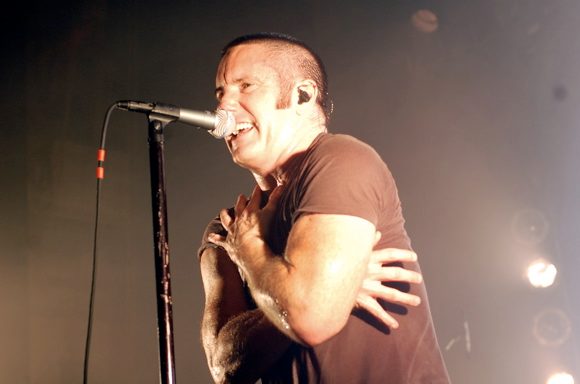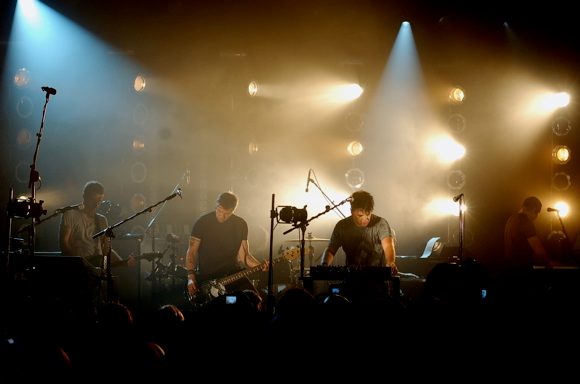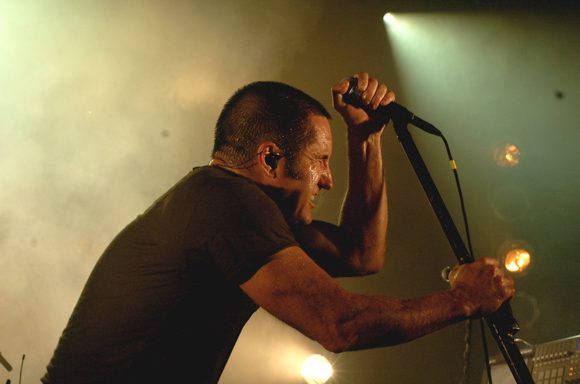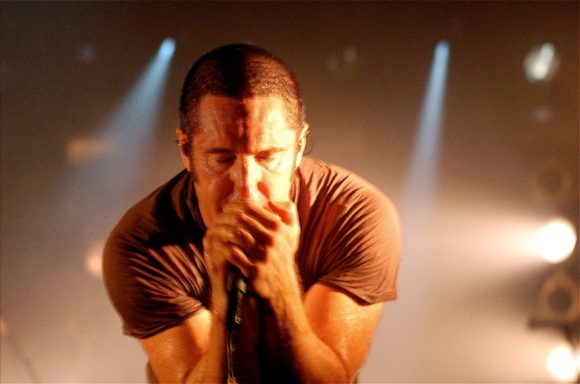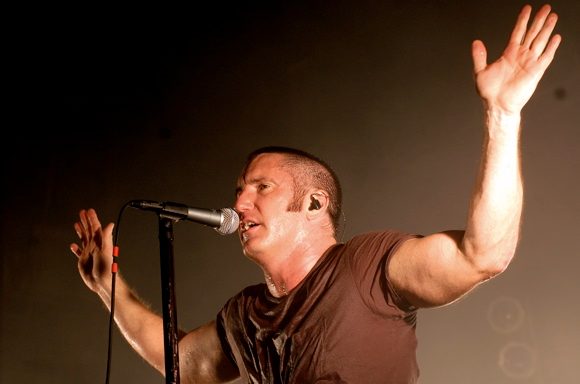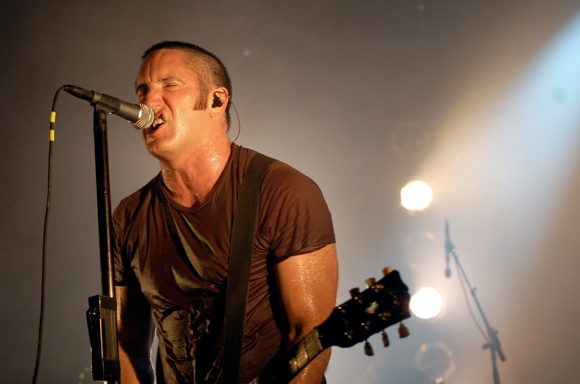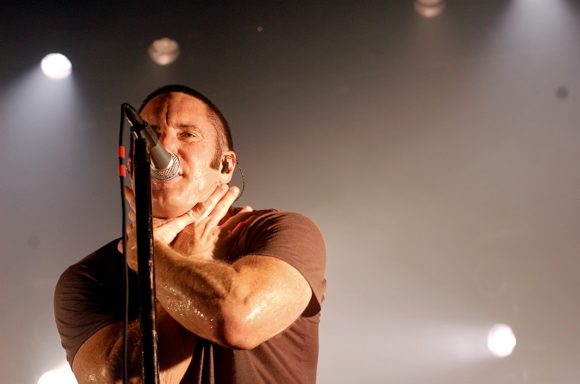A loud smash echoes behind the crowd. That smash is followed by an even bigger crash. One hasty driver has just created an unfortunate and unnecessary three-car pileup directly in the middle of the intersection of Hollywood Boulevard and Gower Street where several hundred Nine Inch Nails fans are patiently waiting to be brought inside Hollywood’s Henry Fonda Theater. The calamity prompts a few fans to rush towards the accident to see what happened, most however, smirk at the carnage and return to face the venue. They’re far too anxious to see one of the final Nine Inch Nails shows ever to be distracted by the sound of broken glass or the horror of viewing twisted steel.
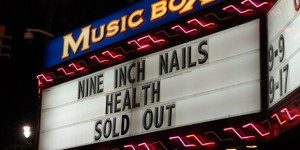

Given that the vast majority of popular music in the last nine years has skewed towards a far-less heavy form of rock and roll, Nine Inch Nails’ position at the top of the music industry (only Radiohead consistently achieves the same level of success and credibility) almost feels like the result of a sudden and violent accident. Impossible to look away, oddly alluring and permanently life changing, Nine Inch Nails has been the pace car for forward-thinking fan-friendly innovation since leader Trent Reznor kicked drugs and fired his longtime manager, John Malm. His cryptic announcement that he intended to retire the band—from apparently at the very least touring—befuddled fans and industry pundits alike, the betting money wagered that a few more years of such persistent quality could push the band to the flag-waving, industry-ruling heights sadly absent from rock and roll these last fifteen years. However, at least for now, this is the end.
Personal Reznor favorites HEALTH opened this penultimate show, making a raucous racket. With the crowd still shuffling about to find their preferred spot, and coupled with the fact that HEALTH seemed to infuse all of their instruments with a heavy tremolo effect, the band didn’t quite have the opportunity to connect with the eager fans. After a standard opener-length set laden with screaming, the stage was empty and anticipation grew to a fever pitch.
Without introduction or greeting, Trent Reznor led his cohorts on stage as the opening syncopated drums of “Head Like a Hole” began. Usually reserved as a set finale, its sinister bassline underplays the accusatory chant of “Bow down before the one you serve / You’re going to get what you deserve.” The familiar tune instantly invokes cathartic screams from the crowd once it explodes into the chorus (“Head like a hole / Black as your soul / I’d rather die / Than give you control”). Now twenty years old, the song is an accurate primer for all that encompasses the band’s vision and style: defiant aggression, danceable darkness, revelatory independent confidence. Fans are treated to “Terrible Lie” and “Sin” next, also from the band’s stellar debut Pretty Hate Machine, both as vital and driving as anything to come.
From there, the set list bounces step-by-step through the strongest material NIN has to offer. Reznor feigns having his skin peeled off on the assaulting “March of the Pigs,” drummer Ilan Rubin turns the outro of “Piggy” into a thunderstorm of fills and Robin Finck’s crawling guitar on “Echoplex” is a potent piece of patience, keeping things paced evenly for other high spots later on in the show. Straightforward rock singles “Survivalism” (from the masterful Year Zero) and “1,000,000” (from the freely available, final album The Slip) both bring confrontational energy to a boiling point, the former through a series of mounting crescendos and the latter through a downright furious call of “Is this really all / that there ever was? / Put the gun / in my mouth / Close your eyes / Blow my fucking brains out.” A four-song succession follows including “Letting You,” “Burn,” “Gave Up” and “Eraser” that bridges the ambitious fire into full-throttle fury. “Burn” in particular (a rarity from the soundtrack to the film Natural Born Killers) is a stupefying amalgamation of Trent Reznor’s knack for cinematic ambience and brutal rage. The audience’s echoing of the song’s threatening promise “I’m gonna burn this whole / world / down” cements that the four piece is firmly focused and in rare form.
And if all that wasn’t enough, Reznor’s introduction of accomplished pianist Mike Garson (previous collaborator of both David Bowie and Smashing Pumpkins) to join the band, started an eleven-song segment featuring a rotating army of NIN friends and collaborators. Garson brought meticulous beauty to the already grand in scope “I Do Not Want This” and “The Becoming,” but most significantly helped bring instrumental track “Just Like You Imagined” from The Fragile to life with vibrant energy. Its mounting percussion and noisy flourishes created an ebb-and-tide effect, with sonic nuance articulated to evoke an epic, wordless tale. As with the other Los Angeles area “Wave Goodbye” shows, Gary Numan then came out to sing his classics “Down in the Park,” “Metal” and “Cars.” During the last of which, and without notice, Jane’s Addiction’s unparalleled bassist Eric Avery appeared stage right holding down the song’s unforgettable rhythm. Openers HEALTH even got in on the act, accompanying NIN, Avery and Numan for a rambunctious cover of the visionary Gang of Four’s “Love Like Anthrax.”
The diehard fans were overjoyed with another pleasant surprise, as for the first of two encores previous guitarist and collaborator Danny Lohner joined the group on guitar and backing vocals. First guiding the quiet/loud dichotomy on anti-religious anthem “Heresy” and then providing the cheerful crunch on a cover of Queen’s “Get Down, Make Love,” Lohner looked like a long-lost brother, instantly adding enthusiasm and weight to the proceedings. Wasting not even a moment, “Mr. Self Destruct” and the timeless “Wish” were next, only when the vocals kicked in on the first of the two it wasn’t Reznor’s familiar rasp. This monstrous howl belonged to Greg Puciato of math metal all stars the Dillinger Escape Plan. “Wish” specifically was a jaw-dropping moment of ecstatic release. It’s hard to imagine a louder singalong than the crowd’s emphatic roar of “Wish there was something real / Wish there was something true / Wish there was something real / in this world full of you.”
The final encore included two inspiring gems, “Atmosphere” and “Dead Souls,” both covers of essential Joy Division songs (the latter Nine Inch Nails contribution to the excellent soundtrack to the film The Crow). Resident NIN bassist Justin Meldal-Johnsen thumped the understated opening line of “Dead Souls” to a huge cheer, the song’s almost minimalist refrain of “They keep calling me” alone worth the price of admission. The band finished with the grinding, otherworldly “The Day the World Went Away” and the beautiful, sullen “Hurt.” Both songs together punctuating distinct high marks in the band’s intrepid sound: one a hazy view into a dream of maniacal confidence, the other a heartbroken vow of optimism.
Coming full circle so much of what made Nine Inch Nails great—both live and on record—now sharpens into focus. They were fearless in a time where most seemed afraid, undaunted by an industry hell-bent on corruption, unpretentious in an era beset by posturing and honest even when it was far from convenient. It’s hard not to view this “ending” (whether it’s permanent or temporary) as something of a shame. No one can begrudge Trent Reznor for desiring some finality and growth in his own career for certain, but it would be a job undone by a music journalist if it weren’t stated for the record: music was a better place with Nine Inch Nails in it. In fact, the band’s success was no accident at all. It was exactly what we needed. Trent Reznor’s music captured the pivotal confusion of our world and persistently called for change. Accomplishing with tenacity what many others failed to, it was an unflinching and vital realization of what many amongst us truly needed from our entertainment, just like we imagined it could be. That, and a whole lot more.


